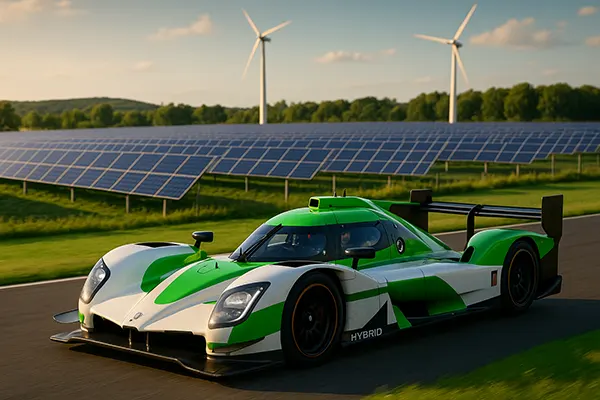Similar articles
Ecological Initiatives in Motorsport: Reducing the Carbon Footprint of Racing

Motorsport, historically known for its speed and spectacle, is now taking meaningful steps toward environmental responsibility. As global awareness of climate change grows, racing organisations are rethinking their approach to energy use, emissions, and sustainability. Through innovative technologies and new operational strategies, motorsport is working to significantly reduce its carbon footprint and inspire change across the wider automotive world.
Innovations Driving Environmental Change in Motorsport
In recent years, motorsport has undergone a significant transformation. Once associated with high emissions and environmental neglect, racing is now actively pursuing sustainability. With climate change becoming an increasingly urgent concern, organisations like the FIA and Formula E are taking tangible steps to reduce the sport’s environmental footprint.
From the implementation of hybrid engines to the development of biofuels, racing series across the globe are innovating at a fast pace. These technologies not only improve sustainability on the track but also contribute to advancements in consumer automotive industries. Motorsport is thus becoming a catalyst for eco-friendly automotive innovation.
Moreover, leading championships are committing to net-zero targets. Formula 1, for example, aims to achieve a net-zero carbon footprint by 2030. This ambition reflects a broader shift in the sport’s values and priorities, aligning racing’s future with ecological responsibility.
Green Engineering and Technology Adoption
The introduction of hybrid and fully electric powertrains is one of the most impactful changes. Formula E, entirely electric, has been instrumental in proving the viability of electric motors in competitive racing. It serves as a real-world testing ground for electric vehicle technology, encouraging the automotive sector to embrace electrification.
Other series, like Formula 1 and the World Endurance Championship (WEC), are integrating hybrid systems that significantly reduce emissions without sacrificing performance. These systems recover energy during braking and redeploy it during acceleration, improving both efficiency and power.
Additionally, the use of sustainable fuels is being trialled. Formula 1 plans to switch to fully sustainable synthetic fuel by 2026, showcasing the sport’s dedication to lowering its environmental impact through innovation.
Operational Sustainability and Environmental Commitments
Beyond the track, motorsport organisations are rethinking their logistics, event management, and operations. Carbon auditing is becoming standard practice, helping teams understand and mitigate their emissions. Sustainable event planning is also on the rise, focusing on waste reduction, energy efficiency, and eco-friendly fan engagement.
Organisers are investing in carbon offsetting projects such as reforestation and renewable energy initiatives. These efforts help to neutralise unavoidable emissions and demonstrate a long-term commitment to planetary health.
Moreover, facilities such as racetracks are being upgraded with solar panels, rainwater harvesting systems, and better public transport links. These measures reduce the overall environmental footprint of each race weekend and foster community sustainability awareness.
Team-Level Environmental Strategies
Individual racing teams are also stepping up. Many have introduced internal sustainability strategies, focusing on supply chain management, ethical sourcing, and reduced energy consumption. McLaren Racing, for instance, has published detailed sustainability reports outlining its environmental targets and progress.
Teams are increasingly employing life cycle assessments (LCA) to evaluate the full environmental impact of their materials and products. This analytical approach ensures that changes are data-driven and effective in reducing emissions.
By making sustainability a core part of their operations, teams are not only improving their environmental performance but also setting an example for other industries to follow.

The Future of Sustainable Racing
The road ahead for motorsport is undoubtedly green. With the rise of hydrogen-powered vehicles and continued electrification, the possibilities are vast. Research is also underway into solid-state batteries and other innovations that could redefine sustainable racing.
Furthermore, collaborations with environmental NGOs, government bodies, and academic institutions are accelerating progress. These partnerships bring in valuable expertise and credibility, ensuring that environmental initiatives are well-informed and scientifically robust.
Public awareness and fan support play a crucial role. As audiences become more environmentally conscious, they expect the same from their favourite sports. Motorsport’s shift towards sustainability is as much about meeting these expectations as it is about protecting the planet.
Global Impact and Educational Role
Motorsport has a unique ability to influence millions of fans worldwide. By adopting green practices, it sends a powerful message about the importance of environmental responsibility. Racing events can act as platforms for education, showcasing green technologies and promoting eco-conscious lifestyles.
Educational programmes linked to racing series, such as STEM initiatives focusing on renewable energy and engineering, help inspire the next generation of scientists and environmentalists. These programmes create a bridge between the sport and broader societal goals.
In conclusion, the motorsport industry is demonstrating that high performance and sustainability are not mutually exclusive. Through innovation, commitment, and education, racing is carving out a new, greener identity that aligns with the challenges and values of the 21st century.



